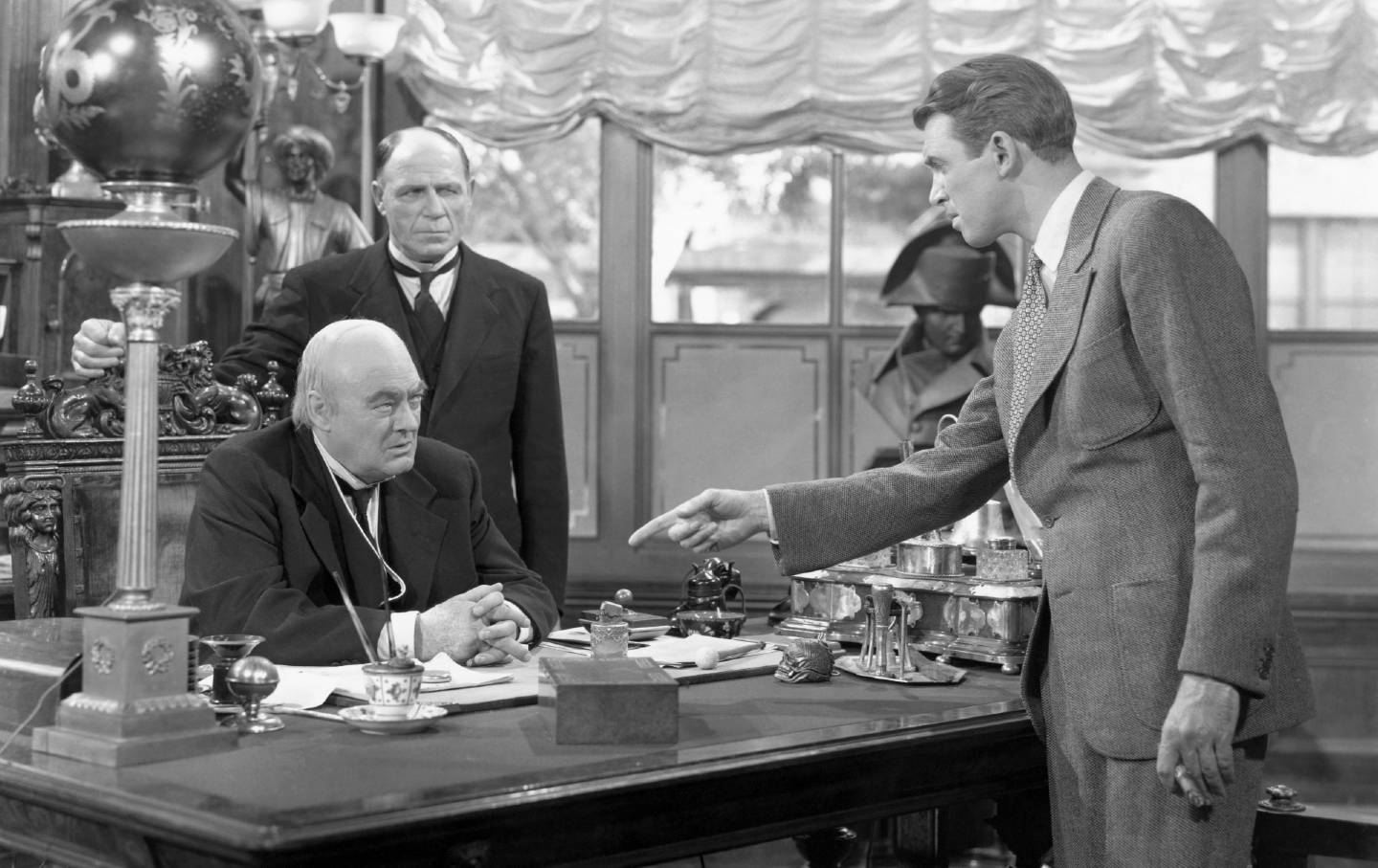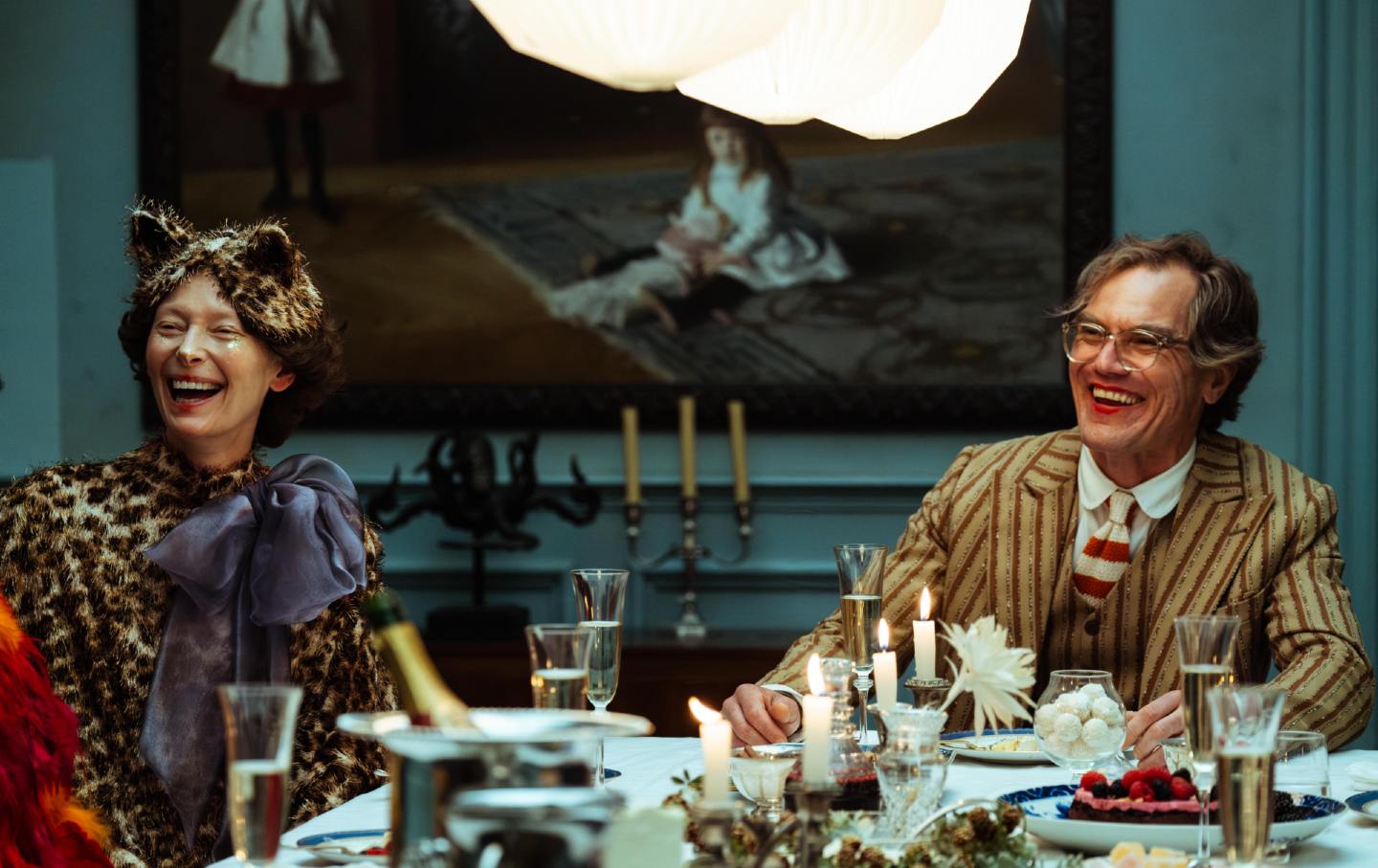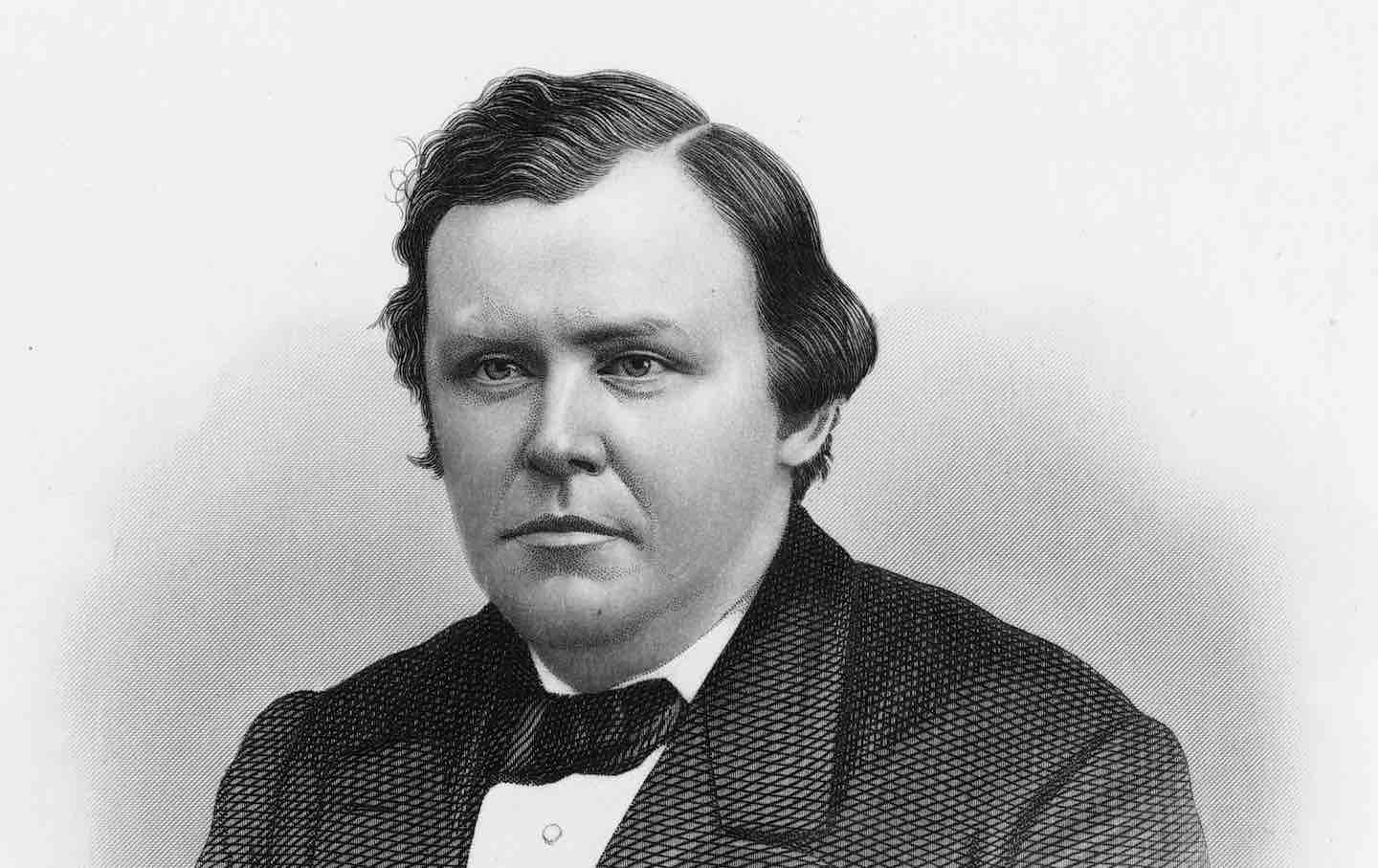Whose “It’s a Wonderful Life” Is It Anyway?
How everybody’s favorite Christmas movie about the perils of monopoly capitalism became a victim of monopoly capitalism.

It was the summer of 1993 when programmers at local TV stations and others across the United States opened their mailboxes to discover cease-and-desist letters from an attorney named James Tierney. The Nation has obtained one, sent to Jeffrey Baker of Good Times Home Video.
“Dear Mr. Baker,” it begins, “if you have been exploiting the film [It’s a Wonderful Life] in any media, you have been violating my clients’ rights under the copyright laws of the United States.”
The broad outlines of the Wonderful Life copyright story have been known for decades, though the details have remained murky until now. It goes something like this: The movie underperformed at the box office in 1947 and was largely forgotten—until a copyright renewal “whoops” in 1974 saw the movie seemingly fall into the public domain. Local television stations began playing the free content, only to discover a strangely receptive audience among Americans of the early 1980s—when the film become a cultural behemoth. Then, somehow, Republic Pictures found a way to reclaim the rights and make a TV deal with NBC, where it has aired ever since.
Chances are you may be one of the millions who tuned in this Christmas Eve to NBC’s 30th annual airing of Wonderful Life. That’s a long run—and a lot of ad dollars collected by NBC off this once-seemingly-public-domain film, not to mention the sales dollars collected by Paramount, who eventually became the owners of Republic.
Last year, when iHeartMedia green-lighted our pitch for George Bailey Was Never Born, a 10-episode audio-documentary podcast series released this November about the movie as a cultural phenomenon, we went in search of how all this really happened. What we learned upends what everyone thought they knew.
James Tierney had been a prosecutor in New York and Los Angeles before remaking himself into a prominent entertainment attorney to the stars. It turns out that, while attempting to strong-arm would-be Wonderful Life broadcasters, Tierney was also in the midst of covering up his own role in a conspiracy to stage the theft of two paintings, Picasso’s Nude Before a Mirror and Monet’s The Customs Officer’s Cabin at Pourville, helping one of his clients collect $17.5 million in a bogus insurance settlement. Within a few years, Tierney would be caught and sentenced to eight months in prison and forced to surrender his license to practice law.
None of this was likely known to Russell Goldsmith, the City National Bank scion turned chairman and CEO of Republic Pictures, successor to National Telefilm Associates (NTA)—the company that had lost the copyright to Wonderful Life—when he hatched his own plan with Tierney in 1993.
Los Angeles Times journalist James Bates got wind of the letters going out and headed to Republic headquarters in Beverly Hills. There, Goldsmith made clear to him that with Wonderful Life nearing its 50th anniversary, he was aghast at the dollars being left on the table by his company.
An era of mergers and acquisitions was dominating the media landscape, and Goldsmith was working to close the deal on what would become a $100 million dollar merger between Republic and Spelling Entertainment that would end up seeing him made president and CEO of Spelling underBlockbuster—at the time a giant in home video rental. The portfolio of intellectual property they could represent would be essential.
Tierney told Bates that regarding Wonderful Life he believed Republic legally held “two barrels of a shotgun.”
The first barrel was music rights. When the movie fell into the public domain, it’s generally understood that all the screenplay drafts and the musical score written for the production fell too, part and parcel of the broader movie’s copyright. In a rather clever move, however, Goldsmith and Tierney went to four music publishers to purchase rights to songs created before the movie was made but used within the soundtrack.
Though the visual images and performances and much of the story heard in the movie now belonged to the public, unless television stations wanted to find a way to strip these songs from the soundtrack and replace them, they suddenly had to deal with Republic. And no such deal was being offered, as Goldsmith had his eyes on NBC and turning Wonderful Life into a lucrative annual TV special.
Thanks to advances in digital technology, it’s now quite possible for any enterprising company or individual to create and release “the people’s version” of this holiday classic with those particular songs replaced. This is where the second barrel of Tierney’s metaphorical shotgun becomes so important: story rights.
Popular
“swipe left below to view more authors”Swipe →“Further,” he wrote in his ‘93 letters, “the Film is based upon the separately-copyrighted literary work by Philip Van Doren Stern entitled ‘The Greatest Gift’ (the ‘Story’). Republic owns the exclusive rights to exploit the Story as embodied in the Film during the renewal term of copyright in the story.”
Van Doren Stern was a mostly nonfiction writer when he had a vivid dream in his Brooklyn apartment in February 1938 that became the basic outline of Wonderful Life. Calling it “The Greatest Gift,” he copyrighted his story in 1943.
Unlike NTA with the movie, Van Doren Stern did successfully renew his story’s copyright in the early 1970s and, upon his 1984 death, those rights transferred to his only daughter and three granddaughters, who formed a family company to manage them.
“[Republic and now Paramount] don’t have copyright in the story, and they’ve never come to us for copyright in the story,” revealed Sarah Robinson to our podcast. She’s one of those granddaughters and president of the Greatest Gift Corporation.
“In 1944, when my grandfather sold…the rights to make movies from the story, and TV and some limited radio, he didn’t sell the copyright in the story or any of the other rights in the bundle,” says Robinson. “In the 1990s, when Republic made its claims about rights it held in the story, all Republic had for rights in the story were those same rights that Capra had had back in 1946, those 1944 rights to make motion pictures of the story, and TV and limited radio.”
The family’s assertion is startling given the case that Republic seems to have made beginning in ’93. After all, if the only rights Republic—and later its parent company Paramount—held in Wonderful Life were to several theoretically replaceable songs in the soundtrack and the ability to commission some further media adaptations based on “The Greatest Gift,” their campaign to stop anyone but NBC from airing it—and the 30 years of profits made as a result of that exclusivity—would be called into question.
But there’s more. Robinson also says that since the year 2000 Republic and now Paramount have no longer even held the ability to commission those further media adaptations. “Fifty-six years after my grandfather granted out those 1944 rights to make movies, TV, and limited radio from his story,” Robinson added, “my mother, his heir, terminated the 1944 grant.”
Consider this statement in the light of another statement, one made by Paramount as recently as 2013, when Nashville-based Hummingbird Productions announced a sequel that many in the public seemed to make clear was rather unwelcome, but still was potentially legally justified.
“No project relating to It’s a Wonderful Life can proceed without a license from Paramount,” the company’s spokesperson announced.
It should be noted that Paramount is believed to hold trademark on the title of the film, and particulars of copyright law in Europe may make the public domain status on parts of that continent questionable as well. But how would that, along with some song rights, give them justification for claiming no project related to Wonderful Life could proceed without their say-so?
The ironic parallels to the story in the movie are hard to ignore. All-time American movie villain Henry F. Potter’s great vice is not being a banker or a business man or a capitalist—it’s his urge towards monopoly.
“He’s already got charge of the bank,” explains George Bailey to his community during the famous “bank run” scene. “He’s got the bus line. He’s got the department stores. And now he’s after us. Why? Well, it’s very simple. Because we’re cutting in on his business, that’s why. And because he wants to keep you living in his slums and paying the kind of rent he decides.”
The full story of Wonderful Life’s journey is detailed in our new podcast George Bailey Was Never Born. Merry Christmas!
More from The Nation

What Comes After the Apocalypse? A Q&A With Joshua Oppenheimer What Comes After the Apocalypse? A Q&A With Joshua Oppenheimer
Oppenheimer’s latest film, The End, is a Golden Age, postapocalyptic musical crying out from the depths of the earth.

The Peculiar Case of Ignatius Donnelly The Peculiar Case of Ignatius Donnelly
The Minnesota politician presents a riddle for historians. He was a beloved populist but also a crackpot conspiracist. Were his politics tainted by his strange beliefs?

The Agony of Aaron Rodgers The Agony of Aaron Rodgers
Is he the world’s most interesting athlete or is he just a washed-up crackpot?

Can You Understand Ireland Through One Family’s Terrible Secret? Can You Understand Ireland Through One Family’s Terrible Secret?
In Missing Persons, Clair Wills's intimate story of institutionalized Irish women and children, shows how a family's history and a nation’s history run in parallel.

Peter Schjeldahl’s Pleasure Principle Peter Schjeldahl’s Pleasure Principle
His art criticism fixated on the narcissism of the entire enterprise. But over six decades, his work proved that a critic could be an artist too.

How the Western Literary Canon Made the World Worse How the Western Literary Canon Made the World Worse
A talk with Dionne Brand about her recent book, Salvage, which looks at how the classic texts of Anglo-American fiction helped abet the crimes of capitalism, colonialism, and more...


